多智能体系统的自适应群集分布式优化
多智能体系统控制与优化技术研究
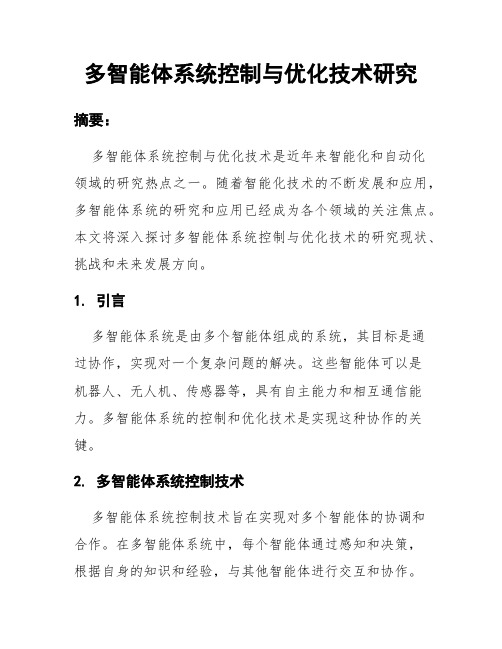
多智能体系统控制与优化技术研究摘要:多智能体系统控制与优化技术是近年来智能化和自动化领域的研究热点之一。
随着智能化技术的不断发展和应用,多智能体系统的研究和应用已经成为各个领域的关注焦点。
本文将深入探讨多智能体系统控制与优化技术的研究现状、挑战和未来发展方向。
1. 引言多智能体系统是由多个智能体组成的系统,其目标是通过协作,实现对一个复杂问题的解决。
这些智能体可以是机器人、无人机、传感器等,具有自主能力和相互通信能力。
多智能体系统的控制和优化技术是实现这种协作的关键。
2. 多智能体系统控制技术多智能体系统控制技术旨在实现对多个智能体的协调和合作。
在多智能体系统中,每个智能体通过感知和决策,根据自身的知识和经验,与其他智能体进行交互和协作。
常用的多智能体系统控制技术包括分布式控制、集中式控制、博弈论等。
分布式控制是指每个智能体根据自身的感知信息和局部控制策略进行决策,实现对整个系统的控制。
这种控制方式具有分散性和自主性,能够灵活应对系统内部或外部的变化。
集中式控制是指通过一个中央控制器对多个智能体进行集中管理和控制。
中央控制器负责收集和整合各个智能体的信息,并根据全局优化目标制定控制策略。
这种控制方式适用于系统规模较小且关联性较大的情况。
博弈论是一种数学工具,用于研究多个决策者之间的策略选择和行为模式。
在多智能体系统中,博弈论可以用于分析智能体之间的竞争和合作关系,并为系统设计提供参考。
3. 多智能体系统优化技术多智能体系统优化技术旨在实现对系统整体的优化和性能提升。
在多智能体系统中,每个智能体的决策和行动都会对整个系统的性能产生影响,因此需要考虑全局优化问题。
一种常用的多智能体系统优化技术是基于遗传算法的优化方法。
遗传算法模拟自然界中的进化过程,通过选择、交叉和变异等操作,搜索全局最优解。
在多智能体系统中,通过适当的目标函数和适应度函数,可以将问题转化为多目标优化问题,为系统决策提供参考。
另一种常用的多智能体系统优化技术是基于协同过滤的优化方法。
基于多智能体系统的分布式优化问题研究

基于多智能体系统的分布式优化问题研究随着社会的发展和科技的进步,越来越多的问题需要通过分布式优化来解决。
而多智能体系统作为一种新型的解决方案,具有非常重要的应用价值。
本文将从多智能体系统和分布式优化问题的关系入手,探讨基于多智能体系统的分布式优化问题研究的现状、挑战和未来发展趋势。
一、多智能体系统与分布式优化问题的关系多智能体系统是由多个互相作用的智能体组成的一种系统,在现实生活中广泛存在。
例如,在自动化控制领域,多个传感器可以组成一个多智能体系统,通过相互协作实现数据的采集和处理。
而在决策和规划领域,人员可以看做是一个多智能体系统,分别拥有不同的能力和知识,通过相互协作实现优化决策。
而分布式优化问题则是多智能体系统所需要解决的核心问题。
分布式优化问题指的是,在一个分散的、节点之间相互连接的计算机网络中,通过各节点之间的协作,使得整个系统的性能指标达到最优。
这种问题比传统的优化问题更具有难度,因为节点之间存在信息不对称、延迟和容量限制等因素,因此需要设计一种协作机制来实现全局最优解。
二、基于多智能体系统的分布式优化问题研究现状基于多智能体系统的分布式优化问题研究已经成为了当前研究的热点之一。
近年来,越来越多的学者将多智能体系统与分布式优化问题紧密结合起来,提出了一系列具有重要应用价值的算法。
其中,蚁群算法、粒子群算法、遗传算法、模拟退火算法等已经被广泛应用于分布式优化问题中,取得了不俗的效果。
例如,在分布式能源管理中,多智能体系统可以被用来实现能量分配的优化。
2019年,中国科学院、清华大学等单位针对分布式能源优化问题,提出了一种基于多智能体系统的混沌群算法。
该算法通过建立各节点之间的通信协议,实现了节点之间的信息共享和协同,从而达到了优化分配能量的目的。
三、基于多智能体系统的分布式优化问题所面临的挑战然而,基于多智能体系统的分布式优化问题还存在着许多挑战。
首先,节点之间的信息传输需要考虑到网络延迟和丢包等因素,这不仅会使得协作过程更加复杂,而且还会影响到优化的结果。
多智能体系统控制策略的优化研究
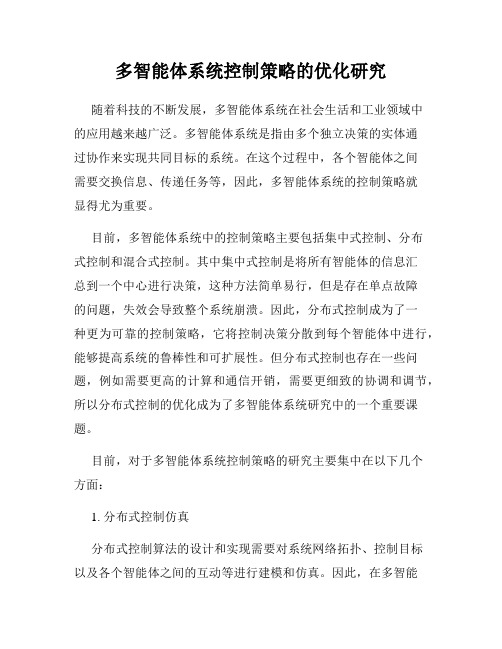
多智能体系统控制策略的优化研究随着科技的不断发展,多智能体系统在社会生活和工业领域中的应用越来越广泛。
多智能体系统是指由多个独立决策的实体通过协作来实现共同目标的系统。
在这个过程中,各个智能体之间需要交换信息、传递任务等,因此,多智能体系统的控制策略就显得尤为重要。
目前,多智能体系统中的控制策略主要包括集中式控制、分布式控制和混合式控制。
其中集中式控制是将所有智能体的信息汇总到一个中心进行决策,这种方法简单易行,但是存在单点故障的问题,失效会导致整个系统崩溃。
因此,分布式控制成为了一种更为可靠的控制策略,它将控制决策分散到每个智能体中进行,能够提高系统的鲁棒性和可扩展性。
但分布式控制也存在一些问题,例如需要更高的计算和通信开销,需要更细致的协调和调节,所以分布式控制的优化成为了多智能体系统研究中的一个重要课题。
目前,对于多智能体系统控制策略的研究主要集中在以下几个方面:1. 分布式控制仿真分布式控制算法的设计和实现需要对系统网络拓扑、控制目标以及各个智能体之间的互动等进行建模和仿真。
因此,在多智能体系统中,分布式控制仿真是非常重要的一步。
目前,已经有很多开源的多智能体仿真工具,例如MADLIB(Multi-Agent Distributed Library)、 Repast 和 P2P-Sim等,这些工具支持多种网络拓扑结构,可以快速构建多智能体系统的模型,并进行各种仿真实验。
2. 自适应控制自适应控制算法可以根据系统的状态和环境改变自身的决策策略,从而适应不同的应用场景。
这种方法通常会利用学习算法,例如强化学习、深度强化学习和演化算法等,来快速学习和适应环境变化。
然而,自适应控制算法的实现需要对学习参数、学习速率以及评估函数等进行细致的调节。
3. 博弈理论博弈理论在多智能体系统中得到了广泛的应用,可以用来研究智能体之间的互动和决策过程。
例如,合作博弈会研究多个智能体如何协作共同达成目标,对抗博弈则研究多个智能体如何在竞争中优化决策。
基于多智能体系统的分布式可控制好
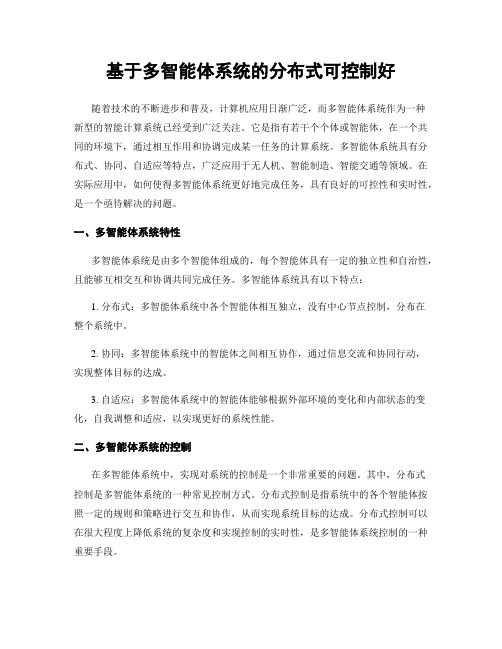
基于多智能体系统的分布式可控制好随着技术的不断进步和普及,计算机应用日渐广泛,而多智能体系统作为一种新型的智能计算系统已经受到广泛关注。
它是指有若干个个体或智能体,在一个共同的环境下,通过相互作用和协调完成某一任务的计算系统。
多智能体系统具有分布式、协同、自适应等特点,广泛应用于无人机、智能制造、智能交通等领域。
在实际应用中,如何使得多智能体系统更好地完成任务,具有良好的可控性和实时性,是一个亟待解决的问题。
一、多智能体系统特性多智能体系统是由多个智能体组成的,每个智能体具有一定的独立性和自治性,且能够互相交互和协调共同完成任务。
多智能体系统具有以下特点:1. 分布式:多智能体系统中各个智能体相互独立,没有中心节点控制,分布在整个系统中。
2. 协同:多智能体系统中的智能体之间相互协作,通过信息交流和协同行动,实现整体目标的达成。
3. 自适应:多智能体系统中的智能体能够根据外部环境的变化和内部状态的变化,自我调整和适应,以实现更好的系统性能。
二、多智能体系统的控制在多智能体系统中,实现对系统的控制是一个非常重要的问题。
其中,分布式控制是多智能体系统的一种常见控制方式。
分布式控制是指系统中的各个智能体按照一定的规则和策略进行交互和协作,从而实现系统目标的达成。
分布式控制可以在很大程度上降低系统的复杂度和实现控制的实时性,是多智能体系统控制的一种重要手段。
而分布式控制中的一种常用方法是基于事件驱动的模型。
该方法通过定义事件和事件动作,对系统中的智能体进行控制和调度,使得系统能够在事件的触发下做出相应的响应。
这种方法不仅能够增加系统灵活性和可扩展性,而且能够提高系统的实时性和效率。
三、多智能体系统的设计在多智能体系统的设计过程中,应注重以下几个方面:1. 系统模型设计:多智能体系统的设计应该尽量贴近实际场景,通过建立数学模型或物理模型对系统进行建模和仿真,以验证系统的可行性和性能。
2. 智能体的建模设计:智能体是多智能体系统中的基本单元,如何设计智能体的模型,对于整个系统的性能和控制至关重要。
基于多智能体系统的分布式自适应控制算法研究

基于多智能体系统的分布式自适应控制算法研究分布式自适应控制算法是一种基于多智能体系统的控制算法,旨在通过智能体之间的协作和自适应机制,实现对复杂系统的控制和优化。
该算法在现代控制领域具有广泛的应用,如智能交通系统、智能电网、无人机编队等。
本文将从多智能体系统、分布式控制算法以及自适应机制三个方面来进行研究和探讨。
首先,多智能体系统是由多个智能体(Agents)组成的系统,在系统中,智能体之间可以通过信息交换和协作来实现某种任务。
每个智能体都具备一定的感知能力和决策能力,通过与环境交互获取信息并进行决策。
多智能体系统的特点是具有分布性、自组织性和合作性。
在这样的系统中,智能体之间的相互作用对于整个系统的性能具有重要影响。
因此,如何设计合适的分布式控制算法来实现智能体之间的协作变得至关重要。
其次,分布式控制算法是一种将控制任务分配给各个智能体,并通过相互之间的协作来实现整个系统的控制的方法。
常见的分布式控制算法包括一致性控制、最优控制和自适应控制等。
其中,自适应控制是一种基于反馈机制的控制方法,通过动态调整控制参数来适应不确定性和变化的环境。
自适应控制算法可以提高系统的鲁棒性和稳定性,对于复杂系统具有良好的适应性。
最后,自适应机制是自适应控制算法的关键部分,它通过学习和优化来调整控制参数,使控制系统能够自动适应不确定性和变化环境。
常见的自适应机制包括模型参考自适应控制(MRAC)、直接自适应控制(DAC)和间接自适应控制(IAC)等。
这些机制基于不同的原理和算法实现,可以根据实际需求选择合适的自适应机制。
在研究基于多智能体系统的分布式自适应控制算法时,我们可以从以下几个方面进行深入研究:首先,需要对多智能体系统的结构和特性进行详细分析和建模。
了解系统的特点和运行机制对于设计合适的分布式控制算法至关重要。
通过建立数学模型和仿真模型,可以对系统的行为进行分析和预测,为后续的算法设计提供理论依据。
其次,需要选择合适的分布式控制算法。
多智能体系统的分布式算法
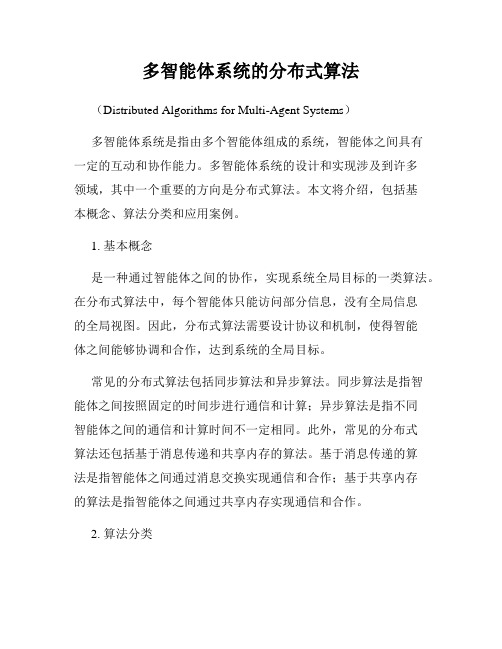
多智能体系统的分布式算法(Distributed Algorithms for Multi-Agent Systems)多智能体系统是指由多个智能体组成的系统,智能体之间具有一定的互动和协作能力。
多智能体系统的设计和实现涉及到许多领域,其中一个重要的方向是分布式算法。
本文将介绍,包括基本概念、算法分类和应用案例。
1. 基本概念是一种通过智能体之间的协作,实现系统全局目标的一类算法。
在分布式算法中,每个智能体只能访问部分信息,没有全局信息的全局视图。
因此,分布式算法需要设计协议和机制,使得智能体之间能够协调和合作,达到系统的全局目标。
常见的分布式算法包括同步算法和异步算法。
同步算法是指智能体之间按照固定的时间步进行通信和计算;异步算法是指不同智能体之间的通信和计算时间不一定相同。
此外,常见的分布式算法还包括基于消息传递和共享内存的算法。
基于消息传递的算法是指智能体之间通过消息交换实现通信和合作;基于共享内存的算法是指智能体之间通过共享内存实现通信和合作。
2. 算法分类常见的分布式算法包括分布式图算法、分布式优化算法和分布式控制算法。
分布式图算法是指通过图模型来表示分布式系统,智能体之间的交互和协作通过图算法来实现。
其中,常见的图算法包括最短路径算法、连通性算法和拓扑排序算法等。
分布式优化算法是指通过优化问题来设计分布式算法。
其中,常见的优化问题包括最小生成树、最大流和最优策略等。
分布式控制算法是指通过控制理论和算法,设计和实现多智能体系统的控制和协作。
其中,常见的控制算法包括状态反馈控制、事件触发控制和模型预测控制等。
3. 应用案例在许多应用领域具有广泛的应用价值。
其中,一些典型的应用案例包括:(1)无人机编队控制。
无人机编队控制是指通过多个无人机之间的协作和控制,实现无人机编队的稳定运动和协同决策。
其中,分布式控制算法和机器学习算法是实现无人机编队控制的关键算法。
(2)智能交通系统。
智能交通系统是指通过智能交通管理、智能车辆控制和智能路网管理等手段,提高交通系统的效率和安全性。
基于多智能体系统的分布式优化算法研究

基于多智能体系统的分布式优化算法研究随着科技的不断进步,多智能体系统成为了应用领域中的重要研究方向。
多智能体系统指的是一组具有独立行为、局部信息交换和协同工作的智能体的集合。
在实践中,多智能体系统被广泛应用于交通控制、智能制造、卫星通信等领域。
本文将探讨基于多智能体系统的分布式优化算法,分析其优点和应用前景。
一、分布式优化算法介绍分布式优化算法是指在分布式系统中解决优化问题的一种方法。
分布式算法之间存在数据传输、信息交互等复杂关系,而多智能体系统很好地解决了这些问题,成为了分布式优化算法的理想载体。
二、多智能体系统优点多智能体系统有以下优点:1. 灵活性:随着更多的智能体加入系统,多智能体系统可以更好地应对环境和任务变化。
2. 并行性:多智能体系统可以同时进行不同任务,从而提高效率和处理速度。
3. 鲁棒性:多智能体系统的结构灵活,当一个智能体出现问题时,整个系统不会受到严重影响。
4. 可扩展性:多智能体系统可以根据需要扩展,充分利用各个智能体的并行处理能力。
三、多智能体系统应用多智能体系统在分布式优化算法中的应用非常广泛。
例如,多智能体系统在交通控制和智能制造领域有着广泛的应用。
1. 交通控制传统的交通控制系统依赖于集中控制,但集中控制系统的效率低下,而且容易出现单点故障问题。
多智能体系统可以优化这个问题,实现交通灯的动态调整和路网优化,提高交通流量和速度。
2. 智能制造多智能体系统可以用于智能制造领域的各个方面。
例如,可以将智能体用于工作流程的规划和优化、质量控制和生产线监控等方面。
通过多智能体系统,可以实现生产效率和质量的提高,降低成本和人工 error rate。
四、多智能体系统的挑战虽然多智能体系统具有很多优点,但在应用过程中还会出现一些挑战,例如:1. 系统复杂性:多智能体系统具有非常高的复杂性,需要对系统进行全面的建模和模拟,这增加了系统的设计和实现成本。
2. 通信成本:多智能体系统需要大量的数据交换和通信,这会导致通信成本和能源消耗的增加。
基于多智能体的分布式控制系统设计与优化
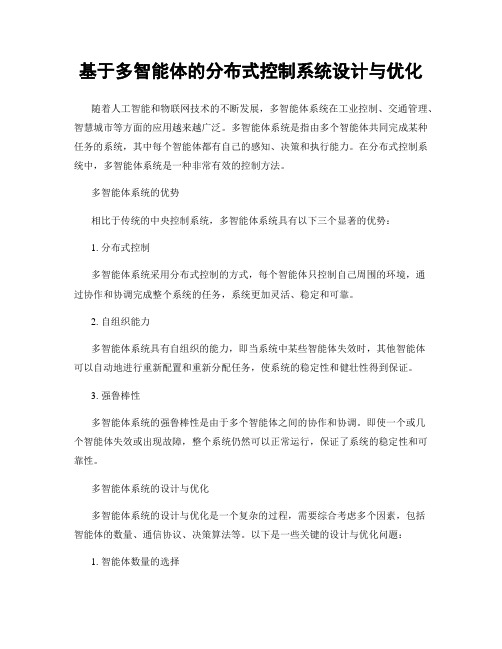
基于多智能体的分布式控制系统设计与优化随着人工智能和物联网技术的不断发展,多智能体系统在工业控制、交通管理、智慧城市等方面的应用越来越广泛。
多智能体系统是指由多个智能体共同完成某种任务的系统,其中每个智能体都有自己的感知、决策和执行能力。
在分布式控制系统中,多智能体系统是一种非常有效的控制方法。
多智能体系统的优势相比于传统的中央控制系统,多智能体系统具有以下三个显著的优势:1. 分布式控制多智能体系统采用分布式控制的方式,每个智能体只控制自己周围的环境,通过协作和协调完成整个系统的任务,系统更加灵活、稳定和可靠。
2. 自组织能力多智能体系统具有自组织的能力,即当系统中某些智能体失效时,其他智能体可以自动地进行重新配置和重新分配任务,使系统的稳定性和健壮性得到保证。
3. 强鲁棒性多智能体系统的强鲁棒性是由于多个智能体之间的协作和协调。
即使一个或几个智能体失效或出现故障,整个系统仍然可以正常运行,保证了系统的稳定性和可靠性。
多智能体系统的设计与优化多智能体系统的设计与优化是一个复杂的过程,需要综合考虑多个因素,包括智能体的数量、通信协议、决策算法等。
以下是一些关键的设计与优化问题:1. 智能体数量的选择智能体数量的选择对于多智能体系统的性能有重要影响。
智能体数量越多,系统的灵活性和可靠性会增加。
但是,智能体数量增加会导致系统的通信复杂度增加,因此需要综合考虑。
2. 通信协议的设计通信协议是多智能体系统中最重要的组成部分之一。
设计恰当的通信协议可以保证智能体之间的信息交换和协调顺利进行。
常用的通信协议包括基于消息传递、基于状态机和基于事件响应等。
3. 决策算法的选择决策算法是指智能体对周围环境的感知和信息处理的过程。
常用的决策算法包括基于规则、基于反馈、基于强化学习和基于深度学习等。
不同的决策算法适用于不同的系统任务和环境。
4. 系统拓扑的优化系统拓扑是指智能体之间的连接方式和结构。
合适的系统拓扑可以提高系统的通信效率和性能。
多智能体系统中的分布式协同控制策略设计与优化

多智能体系统中的分布式协同控制策略设计与优化在多智能体系统中,分布式协同控制策略的设计与优化是非常重要的,它可以实现多个智能体之间的协同工作,提高系统的整体性能和效率。
本文将介绍多智能体系统中分布式协同控制策略的设计与优化方法,并且讨论其在实际应用中的意义与挑战。
多智能体系统是由多个智能体组成的系统,智能体之间可以通过通信和协同工作来完成一定的任务。
在这样的系统中,每个智能体都有自己的感知能力和决策能力,可以根据所接收到的信息做出相应的动作。
分布式协同控制策略的目标就是使得这些智能体能够在没有集中控制的情况下,通过相互通信和协调,共同完成预定的任务。
在设计分布式协同控制策略时,需要考虑各个智能体之间的相互作用和合作方式。
常用的方法之一是基于局部信息的策略设计,即每个智能体只利用其周围智能体的信息进行决策。
这样的策略设计可以减少通信开销和计算复杂度,提高系统的实时性和可扩展性。
另一种方法是基于全局信息的策略设计,即每个智能体可以获得全局信息,并且根据全局信息做出决策。
这种策略设计可以更好地优化整个系统的性能,但是通信和计算开销也更大。
为了优化分布式协同控制策略,可以采用强化学习和优化算法等方法。
强化学习是一种通过智能体与环境的交互来学习最优策略的方法。
在分布式协同控制中,可以将每个智能体视为一个学习智能体,通过与其他智能体的交互来学习最优的协同策略。
另外,优化算法如遗传算法、粒子群算法等也可以用于寻找最优的控制策略。
这些优化算法可以通过搜索策略空间来发现最优的控制策略,从而提高系统的性能和效率。
分布式协同控制策略的设计与优化在许多实际应用中起到关键的作用。
一个典型的应用是无人机编队飞行控制系统。
在这个系统中,每个无人机都有自己的飞行状态和任务要求,需要通过与其他无人机的通信和协同工作来实现编队飞行和任务的完成。
通过设计合适的分布式协同控制策略,可以使得无人机之间保持一定的距离和速度,以达到编队飞行的目的,同时保证每个无人机能够完成自己的任务。
多智能体系统中的集群问题建模与优化控制

多智能体系统中的集群问题建模与优化控制多智能体系统(Multi-Agent System, MAS)是由多个独立个体协同工作的系统。
这些个体可以是机器人、传感器、无人机等智能体,通过相互通信与合作,共同完成任务或解决问题。
集群问题在多智能体系统中是一种常见的任务,并且对其进行建模和优化控制,可以有效提高系统的性能和效率。
在多智能体系统中,集群问题通常指的是将多个智能体划分为几个互相协作的小组,每个小组负责完成特定的任务。
集群问题的建模是指将系统各个智能体、任务和约束条件等因素转化为数学模型,以便进行分析和优化。
而优化控制则是指在给定的约束条件下,通过调整智能体之间的协作关系、任务分配和资源分配,使得整个系统的性能达到最优。
集群问题的建模可以采用图论的方法。
首先,将每个智能体表示为图中的节点,节点之间的连接表示智能体之间的通信和合作关系。
然后,将集群问题转化为图中的子图划分问题,即在保证每个子图内部连接紧密的同时,尽量减少子图之间的连接。
这样可以将多智能体系统分为若干个相互独立的子系统,提高了任务执行的效率。
优化控制的目标是通过合理的任务分配和资源分配,使得整个系统的性能最优化。
这需要考虑到多个因素的影响,例如智能体之间的通信延迟、任务的紧急程度和资源的稀缺性等。
一种常见的优化方法是使用分布式算法,每个智能体根据局部信息进行决策,然后通过协调和合作实现全局最优。
另外,集群问题的建模和优化控制也可以使用机器学习的方法。
通过训练数据和模型学习,智能体可以通过自主学习和决策来解决集群问题。
机器学习可以提供更灵活的建模和控制方法,适应性更强,适用于复杂的多智能体系统。
在集群问题建模和优化控制的研究中,还需考虑到实际应用的需求和限制。
例如,在无人机集群中,需要考虑到空域约束和飞行障碍物的影响;在机器人集群中,需要考虑到物体抓取和运输的限制等。
集群问题的建模和优化控制需要综合考虑各种因素,确保系统在实际应用中能够稳定运行并取得良好的效果。
分布式多智能体系统的优化算法研究

分布式多智能体系统的优化算法研究随着人工智能技术的飞速发展,多智能体系统也逐渐成为研究热点。
多智能体系统是一种由多个智能体组成的网络系统,具有分布式的特点,每个智能体都可以相互通信和协作,在实际应用中具有广泛的潜力。
然而,如何优化多智能体系统的效率和性能,成为了一个重要的研究课题。
本文将重点探讨分布式多智能体系统的优化算法研究。
一、分布式多智能体系统介绍分布式多智能体系统(Distributed Multi-Agent System,DMAS)由多个智能体组成,每个智能体在不同的环境中可以执行独立任务或者互相合作,通过相互交流来完成任务。
多智能体系统由于具有多样性、灵活性、鲁棒性和可扩展性等优点,广泛应用于自动驾驶、机器人控制、智能交通、电力控制和分布式计算等领域。
二、多智能体系统中的优化问题在多智能体系统中,智能体之间的互动和协作对整个系统的效率和性能都有着至关重要的影响。
因此,如何优化系统的协作和效率成为研究的热点问题。
在多智能体系统中常见的优化问题包括资源分配、任务分配、联合协作和目标优化等。
1.资源分配资源分配是多智能体系统优化的重要问题之一,包括对空间、时间以及各种物质和能量等资源的分配。
例如,在机器人控制领域,多个机器人需要在一个环境中共同完成某些任务,需要合理分配资源和任务,以提高整个系统的效率和性能。
2.任务分配任务分配是多智能体系统中另一个重要的优化问题,包括将任务分配到具体的智能体上并安排任务的执行顺序,以最大化整个系统的效率和性能。
例如,在自动驾驶领域中,多个车辆需要协同完成路径规划和交通流控制任务,需要合理地分配任务,以避免交通拥堵和交通事故。
3.联合协作多智能体系统中的智能体之间可以进行联合协作,共同完成复杂任务。
当智能体之间存在合作关系时,需要找到最佳的合作策略来提高整个系统的效率和性能。
例如,在智能电网中,多个发电机需要协同控制,以保证电网的稳定性和可靠性,需要找到最好的合作策略。
多智能体系统中的分布式协同控制与优化策略研究

多智能体系统中的分布式协同控制与优化策略研究随着科技的不断进步,多智能体系统在各个领域中得到了广泛的应用。
多智能体系统是由多个智能体组成的系统,智能体之间可以进行信息交流和协作,共同完成复杂的任务。
然而,要实现多智能体系统的高效运行,需要对其进行合理的控制与优化。
本文将重点研究多智能体系统中的分布式协同控制与优化策略。
分布式协同控制是多智能体系统中的关键问题之一。
多智能体系统中的每个智能体都具有一定的自治性,能够根据自身的传感器信息和局部目标做出相应的决策。
分布式协同控制的目标是通过智能体之间的协作,使整个系统能够实现全局目标。
在分布式协同控制中,信息交流和共享是非常重要的。
智能体之间通过传输自身的状态和决策信息来实现协同控制。
然而,在实际系统中,由于信息传输的时延、噪声等因素的存在,如何在有限的信息交流条件下实现高效的分布式协同控制是一个具有挑战性的问题。
针对分布式协同控制中的挑战,研究者提出了一系列的优化策略。
其中之一是基于图论的方法。
图论可以用来描述多智能体系统中的智能体间的连接关系。
通过构建适当的图模型,可以利用图论中的路径搜索算法和最优化算法来实现分布式协同控制。
另一个常用的优化策略是基于博弈论的方法。
博弈论可以用来描述多智能体系统中的智能体之间的竞争和合作关系。
通过建立合适的博弈模型,可以利用博弈论中的均衡分析方法来实现分布式协同控制。
此外,还有一些基于强化学习和深度学习的优化策略被提出,这些策略能够自动学习智能体的控制策略,从而实现分布式协同控制。
除了分布式协同控制,优化策略也是多智能体系统中的另一个重要问题。
多智能体系统中的智能体往往存在多个目标,例如最小化能量消耗、最大化系统稳定性等。
在面对多目标优化问题时,如何设计合适的优化策略是一个关键的挑战。
研究者提出了一系列的多目标优化方法,其中之一是基于加权函数的方法。
加权函数方法将多个目标线性组合成一个目标函数,然后通过求解单目标优化问题来得到最优解。
基于多智能体系统的分布式优化算法

基于多智能体系统的分布式优化算法现如今,多智能体系统(Multi-agent Systems)已经成为人工智能领域的研究热点之一。
多智能体系统是由多个独立的智能体组成的一种系统,这些智能体可以通过互相协作和竞争来完成任务。
在现实生活中,多智能体系统已经得到了广泛的应用,比如自动驾驶、无人机等。
而在优化领域,多智能体系统也具有着不可替代的优势。
传统的优化算法通常采用集中式的方式,即所有的数据和计算都集中在一个地方进行。
这种方式具有很多弊端,比如数据传输时间长,计算速度慢等。
而基于多智能体系统的分布式优化算法,则具有分布式计算、并行计算等优势,极大地提升了优化算法的效率和精度。
基于多智能体系统的分布式优化算法通常分为两类:无领导算法和有领导算法。
无领导算法是指多个智能体之间没有固定的领导者,而是通过协作和竞争来达成最优解。
而有领导算法则是在多个智能体之间设立一个领导者,通过领导者来引导智能体完成优化任务。
在分布式优化算法中,通信协议是一个非常重要的问题。
不同的通信协议会直接影响到算法的性能。
目前,常用的通信协议有两种:同步协议和异步协议。
同步协议是指多个智能体之间的通信具有同步性,所有智能体在特定时间点进行通信。
而异步协议则是指多个智能体之间的通信具有异步性,每个智能体在需要的时候才进行通信。
在实际应用中,基于多智能体系统的分布式优化算法已经得到了广泛的应用。
比如在机器学习领域中,多智能体系统可以用来进行神经网络的训练,优化神经网络的结构和参数。
在行业生产中,多智能体系统可以用来进行设备和流程的优化,提高生产效率和节约成本。
总之,基于多智能体系统的分布式优化算法具有很多的优势,可以极大地提高优化算法的效率和精度。
但是,在实际应用中,我们也需要针对不同的场景选择不同的算法和通信协议,以达到最优化的效果。
多智能体系统的设计与优化
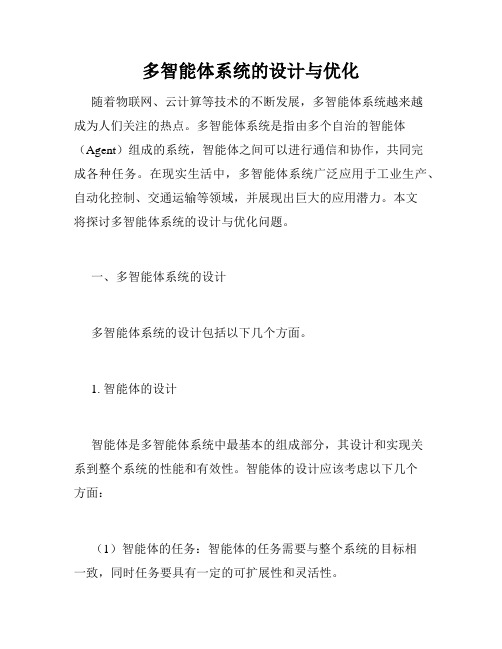
多智能体系统的设计与优化随着物联网、云计算等技术的不断发展,多智能体系统越来越成为人们关注的热点。
多智能体系统是指由多个自治的智能体(Agent)组成的系统,智能体之间可以进行通信和协作,共同完成各种任务。
在现实生活中,多智能体系统广泛应用于工业生产、自动化控制、交通运输等领域,并展现出巨大的应用潜力。
本文将探讨多智能体系统的设计与优化问题。
一、多智能体系统的设计多智能体系统的设计包括以下几个方面。
1. 智能体的设计智能体是多智能体系统中最基本的组成部分,其设计和实现关系到整个系统的性能和有效性。
智能体的设计应该考虑以下几个方面:(1)智能体的任务:智能体的任务需要与整个系统的目标相一致,同时任务要具有一定的可扩展性和灵活性。
(2)智能体的能力:智能体需要具有一定的认知能力、学习能力和决策能力,以实现自主控制和适应性调整。
(3)智能体的通信:智能体之间需要进行通信和协作,通信协议和机制需要进行设计和实现。
2. 多智能体系统的架构设计多智能体系统的架构设计需要考虑如何将多个智能体组织成一个协同的系统,以实现整个系统的目标。
常用的多智能体系统架构包括:(1)中心化系统:由一个中央控制器负责协调管理所有智能体的行为和决策。
(2)分布式系统:多个智能体在系统中等权协作,通过相互协调实现系统目标。
(3)混合系统:将中心化系统和分布式系统相结合,达到相对最优的系统性能。
3. 多智能体系统的控制策略多智能体系统的控制策略直接影响着系统的性态和稳定性。
控制策略需要考虑以下几个方面:(1)智能体之间的相互作用:如何协调各个智能体的行为和决策,避免出现冲突和竞争。
(2)系统的稳定性:多智能体系统的稳定性需要考虑到系统的鲁棒性和自适应性,以应对不同的环境和任务。
(3)性能评价:对多智能体系统的性能进行评价,分析各项指标,以检查系统是否满足需求。
二、多智能体系统的优化多智能体系统的优化主要包括以下几个方面。
1. 参数优化多智能体系统中的各个智能体通常都会有一些相关参数,如学习参数、控制参数等,这些参数的优化直接影响着系统的性能和效率。
多智能体系统的研究与应用
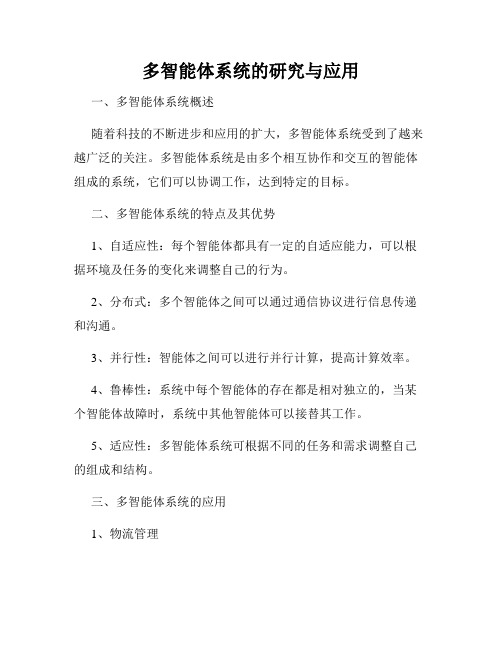
多智能体系统的研究与应用一、多智能体系统概述随着科技的不断进步和应用的扩大,多智能体系统受到了越来越广泛的关注。
多智能体系统是由多个相互协作和交互的智能体组成的系统,它们可以协调工作,达到特定的目标。
二、多智能体系统的特点及其优势1、自适应性:每个智能体都具有一定的自适应能力,可以根据环境及任务的变化来调整自己的行为。
2、分布式:多个智能体之间可以通过通信协议进行信息传递和沟通。
3、并行性:智能体之间可以进行并行计算,提高计算效率。
4、鲁棒性:系统中每个智能体的存在都是相对独立的,当某个智能体故障时,系统中其他智能体可以接替其工作。
5、适应性:多智能体系统可根据不同的任务和需求调整自己的组成和结构。
三、多智能体系统的应用1、物流管理多智能体系统可用于企业的物流管理领域,通过对订单、库存、运输等信息的共享和协调,使得整个物流过程更加高效、快速。
例如,在《供应链与库存管理》的领域中,多智能体系统可用于对库存进行管理,快速响应需求的变化和物品的拆分与组装处理。
2、医疗保健多智能体系统可用于协助医生进行诊断和治疗,提高医疗服务的质量和效率。
例如,智能体可以对病历和医学图像进行自动化处理,帮助医生做出更准确的诊断。
3、智能交通多智能体系统可用于城市的智能交通管理,通过对交通流量和时间变化的预测和优化分配,使得城市的交通行驶更加高效和安全。
4、智能家居多智能体系统可用于家庭的智能化管理,通过对家庭成员的行为和时间的分析,来控制房间的温度、照明、窗户等设备,使得家庭的能源消耗更加节省。
四、多智能体系统的未来展望多智能体技术是未来的研究方向之一,可以产生广泛的影响和应用。
不断地发展和改进多智能体系统的技术,将会带来更多的突破和创新,提高系统的效率和使用价值,拓展多种行业和领域的应用,使得人们生活变得更加便利和高效。
多智能体系统的研究与应用探讨

多智能体系统的研究与应用探讨随着人工智能技术的不断发展和普及,多智能体系统作为一种新的智能模式,正日益受到人们的关注和重视。
这种智能系统由多个智能体协作完成任务,其整体智能性能优于单个智能体,能够应用于包括交通、医疗、物流等各个领域。
本文将探讨多智能体系统的研究和应用现状,并分析其未来发展趋势。
一、多智能体系统的定义和特点多智能体系统是由多个具有不同功能和特点的智能体协同完成特定任务的系统。
从定义上来看,多智能体系统具有以下特点:1. 分布式:多智能体系统中的各个智能体都是分布式的,它们各自独立运作,通过相互通讯和协调合作完成任务。
2. 协同性:多智能体系统的每个智能体都是通过协同互补的方式,保证各个智能体都能发挥最大的作用,以提高系统整体性能。
3. 动态性:多智能体系统的环境往往是动态变化的,因此多智能体系统的适应性也必须具备动态的特点。
4. 自组织性:多智能体系统可以自适应环境,自行变革结构和组织形式,达到智能优化和资源利用的最优状态。
二、多智能体系统的应用多智能体系统可以应用于各个领域,尤其是需要多方协作完成任务的场景。
以下是多智能体系统目前的主要应用领域:1. 交通领域:多智能体系统可以应用于交通管理、智能交通系统和车辆管控等领域。
通过智能交通系统,多智能体系统可以实时获取道路交通信息,及时处理和反馈车行状态,从而提高交通管理效率和交通流量。
2. 医疗领域:多智能体系统可以应用于医疗机器人、辅助医疗等场景。
通过医疗机器人,多智能体系统可以实现医疗机器人和医护人员之间的互动,有效提高医疗服务质量和效率。
3. 物流领域:多智能体系统可以应用于智能物流、物流管理和物流追踪等场景。
通过智能物流系统,多智能体系统可以实时监测物流运输状态和交通拥堵情况,从而提供合理的路线规划和物流配送方案,缩短物流运输时间和成本。
三、多智能体系统的研究进展多智能体系统作为一种新兴的智能模式,目前正处于快速发展阶段。
基于多智能体系统的分布式集群控制研究
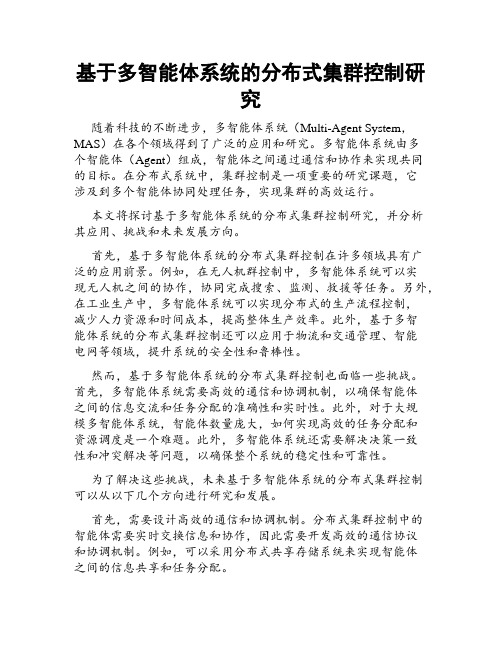
基于多智能体系统的分布式集群控制研究随着科技的不断进步,多智能体系统(Multi-Agent System,MAS)在各个领域得到了广泛的应用和研究。
多智能体系统由多个智能体(Agent)组成,智能体之间通过通信和协作来实现共同的目标。
在分布式系统中,集群控制是一项重要的研究课题,它涉及到多个智能体协同处理任务,实现集群的高效运行。
本文将探讨基于多智能体系统的分布式集群控制研究,并分析其应用、挑战和未来发展方向。
首先,基于多智能体系统的分布式集群控制在许多领域具有广泛的应用前景。
例如,在无人机群控制中,多智能体系统可以实现无人机之间的协作,协同完成搜索、监测、救援等任务。
另外,在工业生产中,多智能体系统可以实现分布式的生产流程控制,减少人力资源和时间成本,提高整体生产效率。
此外,基于多智能体系统的分布式集群控制还可以应用于物流和交通管理、智能电网等领域,提升系统的安全性和鲁棒性。
然而,基于多智能体系统的分布式集群控制也面临一些挑战。
首先,多智能体系统需要高效的通信和协调机制,以确保智能体之间的信息交流和任务分配的准确性和实时性。
此外,对于大规模多智能体系统,智能体数量庞大,如何实现高效的任务分配和资源调度是一个难题。
此外,多智能体系统还需要解决决策一致性和冲突解决等问题,以确保整个系统的稳定性和可靠性。
为了解决这些挑战,未来基于多智能体系统的分布式集群控制可以从以下几个方向进行研究和发展。
首先,需要设计高效的通信和协调机制。
分布式集群控制中的智能体需要实时交换信息和协作,因此需要开发高效的通信协议和协调机制。
例如,可以采用分布式共享存储系统来实现智能体之间的信息共享和任务分配。
其次,需要研究多智能体系统的决策一致性和冲突解决方法。
在分布式环境中,智能体之间可能存在决策不一致和冲突问题,需要设计相应的算法和协议来解决。
例如,可以采用分布式一致性算法来确保智能体之间的决策一致性。
此外,需要研究大规模多智能体系统的任务分配和资源调度问题。
基于多智能体系统的群体智能优化方法研究

基于多智能体系统的群体智能优化方法研究随着人工智能技术的不断发展,越来越多的研究人员将注意力转向了群体智能优化方法,这是一种利用多智能体系统来执行复杂任务的方法。
在本文中,我们将探讨基于多智能体系统的群体智能优化方法,并讨论它们在处理各种实际问题时的应用情况。
1、概述多智能体系统(Multi-Agent System, MAS)是一种利用多个智能体进行协作和交互完成任务的系统。
群体智能优化方法(Swarm Intelligence, SI)是一种基于自组织和分布式协作的优化方法,其灵感来源于仿生学和自然界中的有机体。
在群体智能优化中,不同的智能体通过相互交互并共享信息来协作,以实现任务的优化。
一般来说,每个智能体都有自己的局部知识,如位置和速度,同时也具有对任务的目标函数的局部信息。
通过不断的交互和协作,群体最终会找到全局最优解。
2、基于MAS的群体智能优化方法在多智能体系统中,智能体可以根据不同的任务执行方式进行划分。
具体来说,可以将其划分为完全合作、完全竞争和混合型三类。
完全合作型:在这种情况下,所有的智能体都合作来解决问题。
在这种情况下,智能体之间的交互和协作是相互协调的,这通常可以取得很好的结果。
完全竞争型:在这种情况下,所有的智能体都试图独立地最大化自己的目标函数或其他度量。
在这种情况下,智能体之间的相互作用通常是竞争性的。
混合型:在这种情况下,智能体可以相互竞争和合作,以最大程度地利用每个智能体的优点。
3、应用在现实世界中,基于多智能体系统的群体智能优化方法被广泛应用于各种领域。
下面,我们将介绍一些常见的应用场景。
交通流量优化:在城市交通管理中,基于多智能体系统的群体智能优化方法可以帮助优化交通流量,减少交通拥堵。
机器人协作:在制造业和其他工业领域,多个机器人之间需要进行协作和交互来完成任务。
基于多智能体系统的群体智能优化方法可以使这些机器人更加智能化和高效地完成任务。
资源分配:在决策和资源管理领域,基于多智能体系统的群体智能优化方法可以有效地帮助实现资源的最优分配和最大化利用。
多智能体系统的自适应群集分布式优化
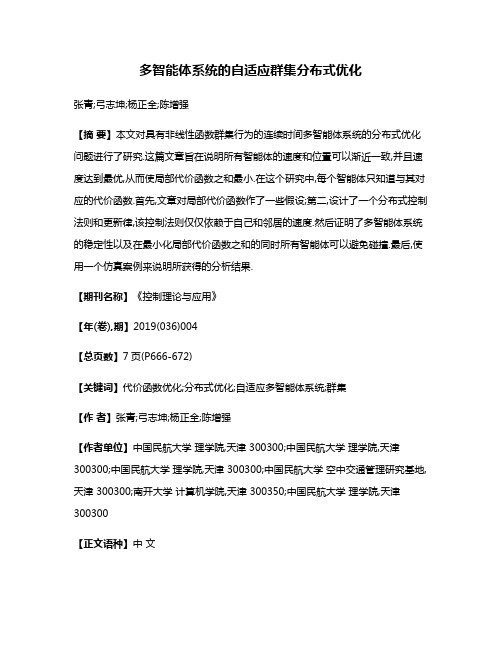
多智能体系统的自适应群集分布式优化张青;弓志坤;杨正全;陈增强【摘要】本文对具有非线性函数群集行为的连续时间多智能体系统的分布式优化问题进行了研究.这篇文章旨在说明所有智能体的速度和位置可以渐近一致,并且速度达到最优,从而使局部代价函数之和最小.在这个研究中,每个智能体只知道与其对应的代价函数.首先,文章对局部代价函数作了一些假设;第二,设计了一个分布式控制法则和更新律,该控制法则仅仅依赖于自己和邻居的速度.然后证明了多智能体系统的稳定性以及在最小化局部代价函数之和的同时所有智能体可以避免碰撞.最后,使用一个仿真案例来说明所获得的分析结果.【期刊名称】《控制理论与应用》【年(卷),期】2019(036)004【总页数】7页(P666-672)【关键词】代价函数优化;分布式优化;自适应多智能体系统;群集【作者】张青;弓志坤;杨正全;陈增强【作者单位】中国民航大学理学院,天津 300300;中国民航大学理学院,天津300300;中国民航大学理学院,天津 300300;中国民航大学空中交通管理研究基地,天津 300300;南开大学计算机学院,天津 300350;中国民航大学理学院,天津300300【正文语种】中文1 IntroductionIn recent years,distributed optimization has drawn great attention of scholars in the field of control,including consensus-basedflocking,distributed optimization,etc[1–7].Minimizing the function which is composed of the sum of local cost functions is the purpose of distributed optimization in distributed manner.Previous researches focused on the distributed optimization problems and most of them were about discrete-time algorithms.For example,Nedic et al.[8]gave a discrete-time sub-gradient optimization rule where each agent is restricted to lie in different convex sets.References[9–10]analyzed distributed optimization problems with inequality-equality constrains or other discrete-time rules in order to ensure that all agents converge to the optimal point.At present,the distributed optimization problem has aroused many scholars’interests in continuous-time algorithm.Wang andElia[11]proposed a novel distributed continuous-time rule for distributed convex optimization by introducing a dynamic integrator.Based on the work[11],Refs.[12–13]studied continuous-time distributed optimization problem by strengthening conditions.Lin et al.[14]studied a convex optimization problem of continuous-time multi-agent system for non-uniform gradient gain,finite-time convergence,etc.Distributed optimization rule based on the edge and the adaptive design method based on nodes are proposed in[15].Wang et al.[16]obtained finite-time consensus theoretically via the proposed non-smooth but continuous forms ofdistributed coordination controllers.The goal of reference[17]is to extend adaptive control with multiple models to the class of systems where the unknown parameters change rapidly and frequently.The distributed optimization problem was studied for high-order integrator dynamicsin[18].Although many articles have studied distributed optimization,many problems need to be solved,such as adaptive distributed optimization.A good adaptive controller can readjust its characteristics under the changing environment.On one hand,it is beneficial to the stable operation of the system.On the other hand,it can enhance the system’s efficiency.The relevant scholars have shown great interest in the research of the flocking problems for multi-agent systems.Recently,flocking in nonlinear systems has been furtherstudied.Referecnces[19–20]showed that global Lipchitz condition works and all followers knew the information of the virtual leader in nonlinear systems.Yang et al.[21]studied distributed velocity optimization of time-varying functions with flocking behavior.It is worth noting that internal structure and other factors are changing in the working process of actual system.These factors might have a negative in fluence on the system.If we don’t take the in fluence of these factors into account,the adaptability of the system in practical engineering is uncertain.Considering the actual situation,the study of distributed optimization with adaptive flocking of multi-agent systems is necessary in theory and practice.The innovation of this paper comes as follows:we design an adaptive distributed optimization algorithm for adaptive flocking of multi-agentsystem to study how a group of agents can achieve optimization cooperatively.This idea can be seen as the extension of flocking.In the distributed optimization algorithm,there is nopre-giventrajectoryorleader,whichis different from the consensus tracking problems.Here is the structure of the paper.We give some notations,concepts and the preliminaries in Section 2.An adaptive distributed controller isdes igned for multiagent system with flocking behavior.Then the system’s stability and the optimization are achieved in Section3.The results we have obtained are illustrated by a numerical case in Section 4.Finally,the full text content is summarized.2 Notations and preliminariesHere are some notations that will be used in thisarticle.Denote1m=(11···1)T,0m=(0 0···0)T.ATis the transpose matrix ofAandxTrepresents the transpose vector ofx.And the unit matrixisIn∈Rn×n.N={1,2,···,N}.is deif ned as the Kronecker product of matrixAandB.Let∥x∥pdenote the p-norm ofx∈Rn.The gradient and Hessian of functiongare∇gand H,respectively.In generally,G=(V,ε)is an undirected graph which is composed of a series of nodesV={1,2,···,N}and a set of linksε.Ifiandjcan be joined thro ugh alink(i,j),then denote by(i,j)∈ε.Ni={j∈V:(j,i)∈ε}stands for neighbor set of nodei.If each pair of nodes inGhas a link connected to each other,we say that the graphGis connected.A=[aij]∈Rn×nis a weighted adjacent matrix of the graphG,which meets theco nditions:1)aii=0;2)aij=aji>0,if(i,j)∈ε;3)aij=0,if(i,j)∈/ε.The degree matrix of the graphGis,wherefori∈N.Dis the correlation matrix related to the graphG.Let−Abe a symmetric Laplacian matrix andL=DDT.The eigenvalues ofLare Defined asλ1(L),λ2(L),···,λN(L),th en the well-known result is given for0=λ1(L)6λ2(L)6···6λN(L)when the graphGis connected.The graphGis connected if and only ifλ1(L)=0with the associatedeigenvector1N=(11···1)T,and all the rest are positive eigenvalues[22]. Lemma 1[22] Considering a continuous differentiable convexfunctiong(s):Rn→R.Thenx∈Rnis a global minimum ofg(s)if and only if. Definition 1[22] g(v)isσ-strongly(σ>0)convex if and only iffor∀v1,v2∈Rn,v1v2.Ifg(v)isσ-strongly convex and twice differentiable onx,thenH(x)>σIn.Lemma 2[23] Th e second smallest eigenvalue λ2(L)of the Laplacian matrixLassociated with the undirected connected graphGsatis fies .We consider a group ofN(N>2)agentsdescribed b ywherexi∈Rn,vi∈Rnrepresent the position vector and velocity vector of the agenti,respectiv ely.And ui∈Rnis the controller of the agenti,continuous functionf(vi)is non-linear part of the system.The goal of this paper is to devise a controlleruifor(1)that enables all agents to achieve the optimal state using local interactive information,in order to solve the following convex optimization problem:wheregi(s):Rn→R is a local cost function and it can only be known by agentiand satis fies the following assumption.Assumption 1 The functiongi(s):Rn→R is convex,differentiable and sat is fieswhere is positive Definite and reversible matrix.The above problem is transformed into minimizingfunction ,that is,The following assumption is given to achieve the goal.Assumption 2 Each functiongi(vi)has a nonempty optimal solution set,that is,there exists satis fies thatis minimum.Definition 2 The potential functionVijis a differentiable non-negative function of∥xi−xj∥which satis fies the following:1)Vij=Vjihas a unique minimum in∥xi−xj∥=dij,wheredijis a desired distance between agentsiandjand;Definition 3(Flocking[24]) A group of mobile agents is saidto(asymptotically) flock,when all agents attain the same velocityvector,distance between the agents is stabilized and no collision between them occurs.Definition 4(Dynamic graphs[24]) We callG(t)=(V,E(t))a dynamic graph consisting of a set of verticesV={1,2,···,N}indexed by the set of agents and a time varying set of linksE(t)={(i,j)|i,j∈V},such that for any0<r<R.1)if0<∥xi(t)−xj(t)∥6r,then(i,j)∈E(t);2)ifr<∥xi(t)−xj(t)∥<R,from Fig.1,when timet0tot1,then(i,j)̸∈E(t);when timet1tot2,then(i,j)is a new edge being added toE(t);3)ifR6∥xi(t)−xj(t)∥,then(i,j)̸∈E(t).Fig.1 The switching process of dynamic graphs according to Definition 4 Undirected dynamic graphG(t)meets that(i,j)∈E(t)and(j,i)∈E(t),which is critical in the article.Moreover,the graph is connected in this paper. Definition 5(Graph Connectivity) We say that a dynamic graphG(t)is connected at timetif there exists a path,that is,any two vertices can form continuous edges inG(t).3 Main resultsIn this section,we presented a distributed adaptive algorithm with flocking behavior.Then we prove that the velocities of the agents reach consensus and the velocities of the agents are optimal while minimizing the function .whereThe coefficientsdi>0andki>0,sgn(·)is the signum function.It need to be pointed out thatϕirelies just on the velocity of agenti.Vijis Defined in Definition 2.∇xiVijcorresponds to a vector in the direction of the negative gradient ofVij.LetV =[v1Tv2T···vNT]T,d=[d1d2···dN]T.We also Defineden otes a consistent error vector.Obviously,zero as a simple eigenvalue ofP,the right eigenvector corresponding to0is1N,and the other eigenvalues are1 with the multiplicityN−1.TheneV(t)=0is equivalent tovi=vj.Theorem 1 By taking the controller(5),if,the velocities of all agents in thegroup described in(1)asymptotically approach the same and collision is avoided.Proof The system(1)with controller(5)can be written aswhereFromeV(t)=(P⊗IN)V,rewriting(6)asDefinite the following function:whereis an arbitrary large constant.The generalized time derivative ofVGis as follows:Using Lemma 1 in[25],we can getFrom(7),we obtainMoreover,Thus,we haveClearly,if,then .It is known from the characteristics ofLto getwhich shows thatVG>0is monotonically decreasing.So the boundness ofeV,dican be seen.FurtherVij,eV∈L∞can be derived.By integrating both side of,we cansee thateV∈L2.By using the Barbalat’s lemma,we geteV→0which is equivalent to the all agents’velocities become consensus ast→∞,i.e.. Becausevi−vj=0fori,j=1,2,···,N,we can getwhich shows that the distance is invariant.Hence,all agents become consensus and the collision is avoided.QED.Remark 1The assumption,∀iin Theorem 1 is regarded as a bound on the difference between the agents’internal signals.If∥f(vi)∥,∥∇gi∥and,∀iare bounded,thenis bounded.Theorem 2 Suppose thatHi(vi)=Hj(vj),∀i,j∈N.For system(1)with controller(5)the problem(4)is solved if the function is designedasf(vi)=where matrixsatis fiesProof It is proved that the system is stable in Theorem 1.Next let us prove the optimization.By denoting,we haveTherefore,we can obtainBy,we can getNote thatis lower bounded according to Assumption 2.is got byand LaSalle’s invariance principle.Then it follows from Lemma 1thatv∗(t)minimizes the differ entiable convex function ast→∞. QED. Corollary 1 Under controller(5),if the nonlinear continuous function is designed asf(vi)=0,all agents in the system(1)converge to the same velocity and collision between agents is avoided.Moreover,the problem(2)is solved. Proof From Theorem 1,we know that all agents’velocities and the distance are invariant in the stable state.By denoting,one hasThen,we can getIt follows by Theorem 1 thatv∗(t)minimizes the differentiable convex functionast→∞.QED.4 Numerical simulationsIn this section,we give an example with five agents.Assume that link rangeR=5,which means that two agents are adjacent when their distance is less thanR.The agent’s task is to minimize the function,whereis the coordinate of agentiin 2D plane.In the example,we use controller(5)for the system(1),the nonlinear function is designed bywhereWe randomly choose the initial velocity of each agent and mark it withdots.The initial status of the agent is shown in Fig.2.The full line between the two dots in the figure represents the path of the adjacent agent,while the arrow represents the velocity of the agent.The final stable state con figuration is shown in Fig.3.The error between the different velocity components and the optimal velocity is described in Fig.4,and the error curves of different velocity components are represented by different lines.From the graph,we can see that the velocities of all agents converge to the optimal velocity.Fig.2 Initial con figuration of agentsFig.3 Final con figuration of agentsFig.4 Errors between agents’and the optimal velocity5 ConclusionsIn this paper,we analyze a distributed optimization problem for adaptive flocking of multi-agent systems.A novel multi-agent adaptive controller is presented to achieve the goal proposed in this paper.First,it proves that the agents can asymptotically achieve flocking behavior,that is,the agents can avoid collision when they have same velocity and invariant distance.Furthermore,it shows that all agents’velocities are asymptotically optimal while minimizing the total cost function.Finally,in order to be recognized for the theoretical results we obtained,we use a simulation case to verify the above results.Our further study will focus on the adaptive flocking of non-linear multi-agent systems with time delay. References:【相关文献】[1]HONG Y,CHEN G,BUSHNELL L.Distributed observers design for leader-follower control of multi-agent networks.Automatica,2008,44(3):846–850.[2]SONG Q,CAO J,YU W.Second-order leader-following consensus of nonlinear multi-agent systems via pinning control.Systems&Control Letters,2010,59(9):553–562.[3]ZHAO Y,DUAN Z,WEN G,et al.Distributed finite-time tracking of multiple non-identical second-order nonlinear systems with settling time estimation.Automatica,2016,64:86–93.[4]SU H,CHEN G,WANG X,et al.Adaptive second-order consensus of networke dmobileagents with nonlineardynam.Automatica,2011,47(2):368–375.[5]ZHAO Y,LIU Y,LI Z,et al.Distributed average tracking for multiple signals generated by linear dynamical systems:An edge-based framework.Automatica,2017,75:158–166.[6]NEDIC A,OZDAGLAR A.Distributed subgradient methods for multi-agent optimization.IEEE Transactions on Automatic Control,2009,54(1):48–61.[7]NEDIC A,OLSHEVSKY A.Distributed optimization over time varying directed graphs.IEEE Transactions on Automatic Control,2014,60(3):601–615.[8]NEDIC A,OZDAGLAR A,PARRILO P.Constrained consensus and optimization in multi-agent networks.IEEE Transactions on Automatic Control,2010,55(4):922–938.[9]JOHANSSON B,KEVICZKY T,JOHANSSON M,et al.Subgradient methods and consensus algorithms for solving convex optimization problems.Proceedings of the 47th IEEE Conference on Decision and Control.Cancun,Mexico:IEEE,2008:4185–4190.[10]LU J,TANG C,REGIER P,et al.Gossip algorithms for convex consensus optimization over networks.IEEE Transactions on Automatic Control,2012,56(12):2917–2923.[11]WANG J, ELIA N. A control perspective for centralized and distributed convex optimization.Proceedings of the 50th IEEE Conference on Decision and Control and European Control Conference.Orlando,FL,USA:IEEE,2011:3800–3805.[12]GHARESIFARD B,CORTES J.Distributed continuous-time convex optimization on weight-balanced digraphs.IEEE Transactions on Automatic Control,2012,59(3):781–786. [13]KIA S,CORTES J,MARTINEZ S.Distributed convex optimization via continuous-time coordination algorithms with discrete-time communication.Automatica,2015,55:254–264.[14]LIN P,REN W,FARRELL J.Distributed continuous-time optimization:nonuniform gradient gains,finite-time convergence,and convex constraint set.IEEE Transactions on Automatic Control,2016,62(5):2239?–2253.[15]ZHAO Y,LIU Y,WEN G,et al.Distributed optimization of linear multi-agentsystems:edge-and node-based adaptive designs.IEEE Transactions on Automatic Control,2017,62(7):3602–3609.[16]WANG X,HONG Y.Finite-time consensus for multi-agent networks with second-order agent dynamics.IFAC Proceedings Volumes,2008,41(2):15185–15190.[17]GEORGE K,SUBRAMANIAN K.Adaptive control of a class of nonlinear time-varying systems with multiple models.Control Theory and Technology,2016,14(4):323–334. [18]ZHANG Y,HONG Y.Distributed optimization design for secondorder multi-agent systems.Proceedings of the 33rd IEEE Control Conference.Nanjing,China:IEEE,2014:1755–1760.[19]ZHANG Q,LI P,YANG Z,et al.Adaptive flocking of non-linear multi-agents systems with uncertain parameters.IET Control Theory and Applications,2015,9(3):351–357.[20]YU P,DING L,LIU Z,et al.Leader–follower flocking based on distributed event-triggered hybrid control.International Journal of Robust and Nonlinear Control,2016,26(1):143–153.[21]YANG Zhengquan,ZHANG Qing,CHEN Zengqiang.Distributed velocity optimization of time-varying functions with flocking behavior.ControlTheory&Applications,2017,34(2):1648–1653.(杨正全,张青,陈增强.具有群集行为的时变函数分布式优化.控制理论与应用,2017,34(2):1648–1653.)[22]CHUNG F.Spectral graph theory.Conference Board of the mathematical sciences by the American Mathematical Society.California,USA:American Mathematical Society,1997.[23]BOYD,VANDENBERGHE,FAYBUSOVICH.Convex optimization.IEEE Transactions on Automatic Control,2006,51(11):1859–1865.[24]OLFATISABERR,MURRAYR.Consensus problem sinnet works of agents with switching topology and time-delays.IEEE Transactions on Automatic Control,2004,49(9):1520–1533.[25]ZAVLANOS M,JADBABAIE A,PAPPAS G.Flocking while preserving network connectivity.Proceedings of the 46th IEEE conference on Decision and Control.New Orleans,LA,USA:IEEE,2007:2919–2924.。
- 1、下载文档前请自行甄别文档内容的完整性,平台不提供额外的编辑、内容补充、找答案等附加服务。
- 2、"仅部分预览"的文档,不可在线预览部分如存在完整性等问题,可反馈申请退款(可完整预览的文档不适用该条件!)。
- 3、如文档侵犯您的权益,请联系客服反馈,我们会尽快为您处理(人工客服工作时间:9:00-18:30)。
控制理论与应用
Controlo. 4 Apr. 2019
多智能体系统的自适应群集分布式优化
张 青1, 弓志坤1, 杨正全1,3†, 陈增强2,1
(1. 中国民航大学 理学院, 天津 300300; 2. 南开大学 计算机学院, 天津 300350; 3. 中国民航大学 空中交通管理研究基地, 天津 300300)
摘要: 本文对具有非线性函数群集行为的连续时间多智能体系统的分布式优化问题进行了研究. 这篇文章旨在说明 所有智能体的速度和位置可以渐近一致, 并且速度达到最优, 从而使局部代价函数之和最小. 在这个研究中, 每个智能 体只知道与其对应的代价函数. 首先, 文章对局部代价函数作了一些假设; 第二, 设计了一个分布式控制法则和更新律, 该控制法则仅仅依赖于自己和邻居的速度. 然后证明了多智能体系统的稳定性以及在最小化局部代价函数之和的同时 所有智能体可以避免碰撞. 最后, 使用一个仿真案例来说明所获得的分析结果.
1 Introduction
In recent years, distributed optimization has drawn great attention of scholars in the field of control, including consensus-based flocking, distributed optimization, etc[1–7]. Minimizing the function which is composed of the sum of local cost functions is the purpose of distributed optimization in distributed manner.
关键词: 代价函数优化; 分布式优化; 自适应多智能体系统; 群集 引用格式: 张青, 弓志坤, 杨正全, 等. 多智能体系统的自适应群集分布式优化. 控制理论与应用, 2019, 36(4): 666 – 672 DOI: 10.7641/CTA.2018.80562
Distributed optimization for adaptive flocking of multi-agent systems
3. Air Traffic Management Research Base, Civil Aviation University of China, Tianjin 300300, China) Abstract: A distributed optimization problem is investigated for continuous-time multi-agent systems with flocking behavior of a nonlinear continuous function. This paper aims at showing that the velocities and positions of all agents can be the same asymptotically and the velocity is optimal, thus minimizing the sum of local cost functions. In this study, each cost function can only be known to its corresponding agent. Firstly, the paper makes some assumptions about the local cost function; Secondly, a distributed control rule and updating laws are designed, in which each agent depends only on its own velocity and neighbor’s velocity. Then, the stability of the multi-agent systems is proved and the agents can avoid inter-agent collision while minimizing the sum of local cost functions. Finally, using a simulation case to illustrate the obtained analytical results. Key words: cost function optimization; distributed optimization; adaptive multi-agent system; flocking Citation: ZHANG Qing, GONG Zhikun, YANG Zhengquan, et al. Distributed optimization for adaptive flocking of multi-agent systems. Control Theory & Applications, 2019, 36(4): 666 – 672
Previous researches focused on the distributed optimization problems and most of them were about discrete-time algorithms. For example, Nedic et al. [8] gave a discrete-time sub-gradient optimization rule where each agent is restricted to lie in different con-
ZHANG Qing1, GONG Zhi-kun1, YANG Zheng-quan1,3†, CHEN Zeng-qiang2,1
(1. College of Science, Civil Aviation University of China, Tianjin 300300, China; 2. Department of Automation, Nankai University, Tianjin 300071, China;
